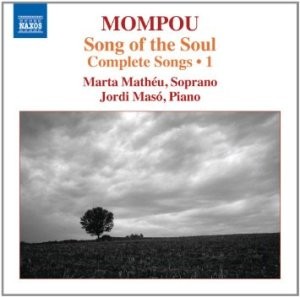“Whoever she is, that singer really knows how to sing a song.” Those unsolicited words came from a professional singer/long-time voice teacher who happened to be in the next room when I first listened to this recording. The singer being praised is soprano Marta Mathéu, whose roots in Tarragona and Barcelona connect her personally and culturally to the music of composer Frederic Mompou, not to mention giving her the benefit of fluency in the Catalan language in which many of these songs are set. And the above assessment of her performing skill is right on. As with many sopranos, her tone occasionally is subject to a sudden glare when emphasizing particular vowels (especially the “ee” sound) at louder dynamics–yet she normally projects a lovely, warm, young-womanly quality that she uses to good effect, varying her use of vibrato and changing the voice’s tonal character to create tension or tenderness or to lend a mysterious aspect.
Although the predominant stylistic influence is late-19th/early-20th century French, the melodies range from folksong-like beauty and simplicity–especially in the Catalan songs and in the unusual three settings of Maeterlinck’s Quand l’amant sortit–to freer and more angular (the Cinq mélodies sur des textes de Paul Valéry from 1973, often cited as Mompou’s finest vocal work); all are effectively, impressively enhanced by the piano’s harmonic frameworks and various pictorial or “coloristic” gestures. Listen to the piano’s sombre tolling, sometimes slow and heavy, other times faster in the compellingly moody “L’hora grisa”–with its opening line, which translates “Everyone sleeps in the gray hour…”
But just as many of these songs impress with their French or Catalan character, then comes “Mira quina resplendor” (See what splendor), which in spite of its Catalan text sounds as much like it could be a lost arrangement from one of Britten’s English folksong collections. It’s a charming addition to this recital, and Mathéu sings it with an affecting, lighthearted style. The following Quatre mélodies (sung to Mompou’s own Catalan texts), all of them very short, are nevertheless among the program’s most emotionally engaging, and Mathéu is at her best here, drawing us easily into the dreamy, shadowy ambience along with her able accomplice, Jordi Masó, whose playing throughout demonstrates his special sensitivity to his partner’s voice and interpretive nuances, and also his affinity for Mompou’s evocative piano writing (Mompou is best known for his piano music, and Masó has recorded all of it for Naxos). Another highlight is the unusual song “Cantar del alma” (song of the soul), which alternates solo piano with unaccompanied vocal sections, which are in the style of plainchant or recitative. Both performers hold us firmly entranced, especially Mathéu, with her beautifully controlled phrasing and alluring vocalism.
Although the inclusion of publisher information for this hard-to-find music is very, very welcome, it’s too bad that we don’t also have access to the song texts and, more important, translations–an online search led me to believe that this could be because of some bizarre and unfortunate copyright prohibitions, and if that’s the case, what can you do but spend tedious hours tracking down texts and performing your own translations? Or, you can just listen and enjoy these songs as they are, so beguilingly performed by two artists who really know and care about this rarely-heard, eminently worthy repertoire. And there’s more: Mathéu and Masó have recorded a second volume, which with this one will give you the complete Mompou songs–a very good deal, and a very good time.
































